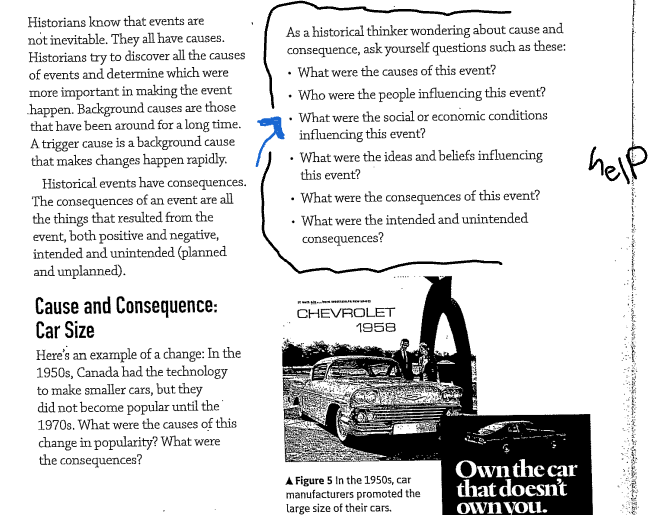As a historical thinker wondering about cause and consequence, ask yourself questions such as these: • What were the causes of this event? • Who were the people influencing this event? • What were the social or economic conditions influencing this event? • What were the ideas and beliefs influencing this event? • What were the consequences of this event? • What were the intended and unintended consequences?
As a historical thinker wondering about cause and consequence, ask yourself questions such as these: • What were the causes of this event? • Who were the people influencing this event? • What were the social or economic conditions influencing this event? • What were the ideas and beliefs influencing this event? • What were the consequences of this event? • What were the intended and unintended consequences?
Related questions
Question
Please answer the question where the 6 dots - help

Transcribed Image Text:Historians know that events are
not inevitable. They all have causes.
Historians try to discover all the causes
of events and determine which were
more important in making the event
happen. Background causes are those
that have been around for a long time.
A trigger cause is a background cause
that makes changes happen rapidly.
As a historical thinker wondering about cause and
consequence, ask yourself questions such as these:
• What were the causes of this event?
• Who were the people influencing this event?
· What were the social or economic conditions
influencing this event?
• What were the ideas and beliefs influencing
help
this event?
Historical events have consequences.
The consequences of an event are all
the things that resulted from the
event, both positive and negative,
intended and unintended (planned
and unplanned).
• What were the consequences of this event?
• What were the intended and unintended
consequences?
Cause and Consequence:
Car Size
CHEVROLET
1958
Here's an example of a change: In the
1950s, Canada had the technology
to make smaller cars, but they
did not become popular until the
1970s. What were the causes of this
change in popularity? What were
the consequences?
A Figure 5 In the 1950s, car
manufacturers promoted the
large size of their cars.
Qwnthe car
that doesn't
ownyou.
Expert Solution
This question has been solved!
Explore an expertly crafted, step-by-step solution for a thorough understanding of key concepts.
Step by step
Solved in 2 steps
